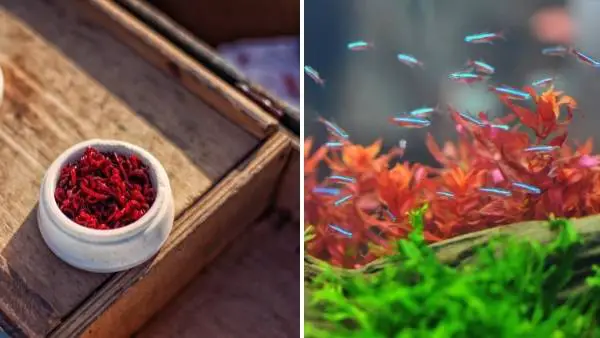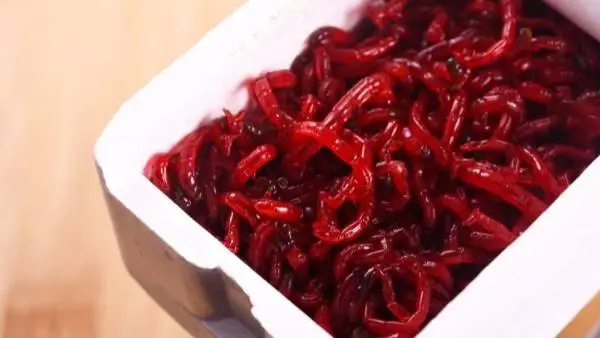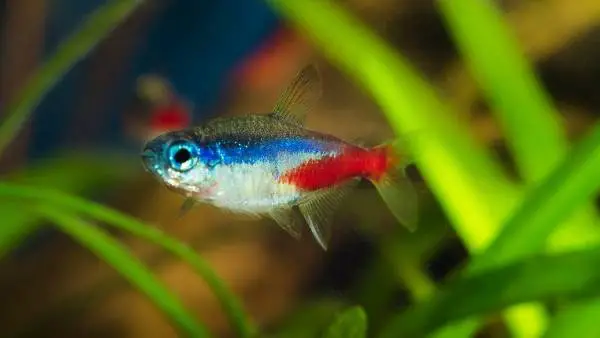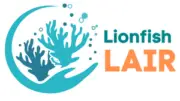Bloodworms seem to constantly find themselves on lists when people talk about the best diets for omnivorous fish and carnivorous fish, and fish seem to absolutely love them, but can tetras eat bloodworms? Tetras will certainly accept bloodworms and consider them a favorite in their regular diet. As long as you ensure that you are preparing the bloodworms correctly and feeding them to your tetras in moderation, you can feed your tetra fish bloodworms for their whole life.

What Bloodworms Can Tetras Eat?
Bloodworms are a "treat" for tetras as they should not be fed them all the time, but they certainly enjoy eating them when the time comes. Here are the two different types of bloodworms you could feed to your tetras.Midge Fly Larvae
Midge fly larvae certainly have the same shape and general appearance as worms and they are also bright red in color, which is why they have adopted the name "bloodworm". They are the most common type of bloodworm and are the most readily available in stores.
Bristle Worms
These worms are a bit pinker in color, rather than bright red, like the midge fly larvae. They can be found individually or as a pack in stores, but they can grow up to 14 inches (35 cm) in length, which is why they are less commonly found.
How To Acquire Bloodworms For Your Tetras and What Are The Benefits?
Bloodworms are widely sold throughout pretty much any pet store, and certainly every fishkeeping store. They also come in different forms too, which have their pros and cons, so, let's have a look and see what they are.
Frozen Bloodworms
Typically sold in groups of small blocks or sheets, frozen bloodworms are midge fly larvae that must be kept frozen after being purchased and between feeding times. Frozen bloodworms are brilliant if you use them as a special treat, maybe feeding them to your tetras once a week or so, they will remain preserved for a long time.
Pros:
Frozen bloodworms last for months in your freezer and are easy to acquire as they are sold in most pet and fish shops. They are available to purchase in bulk and in smaller quantities and are affordable.
Cons:
They contain fewer nutrients than the other types of bloodworms and do not allow tetras to hunt and kill them as they would do with live bloodworms in the wild.

Freeze Dried Bloodworms
Sold in feeding containers, with the most common sizes being 4 oz and 8 oz, freeze dried bloodworms are an awesome option. They must be kept in a cool, dry place until it is time to feed your tetras, when the time arrives they will need to be rehydrated.
Pros:
They are affordable and widely sold, so, you should not have any problem finding them. In addition to this, they last a long time.
Cons:
Similar to the frozen blood worms, they do not allow your tetra to hunt and kill them and they also need to be rehydrated before you feed them to your fish, which can lead to health issues if they are not properly rehydrated.
Live Bloodworms
Live bloodworms are certainly the most challenging to find and also keep hold of. Once you have managed to track them down you must keep them in the refrigerator and in conditioned water.
Due to them being live, they will provide much entertainment for your tetras as well as a tasty snack, but they will only last around 5 days maximum because they will turn into a midge fly eventually!
Pros:
They are easy to portion and also cause your tetras to hunt and kill them, replicating their behavior in the wild. Live bloodworms also contain more nutrients and can be purchased in bulk or smaller quantities.
Cons:
Live bloodworms are much more difficult to get hold of than the others, and they only last a few days. Also, they must be rinsed and washed prior to feeding as they can carry diseases and bacterial infections.
Additional Tetra Food
It is important to keep in mind that your tetra's diet should never consist only of bloodworms, they are seen as more of an addition to a healthy diet. Other than bloodworms, you should also feed your tetra fish:
- Tubifex
- Brine Shrimp
- Insect Larvae
- Vegetables
- Flake food
- Pellet Food

These additional foods are healthy and packed with dozens of nutrients to create a balanced and stable diet for your tetra fish. Meats should be the main aspect of their diet, with a healthy amount of vegetables, flakes, and pellets too.
Conclusion
The popularity of bloodworms being used as aquarium food has skyrocketed in recent years, which is great for your tetras as they love them! What makes bloodworms such a useful food for fish is that they can be fed to both freshwater and saltwater fish.
For tetra fish specifically, bloodworms are always a fantastic addition to their regular diet and should be used as a weekly or twice a month treat along with all of the other foods their specific diet requires.

